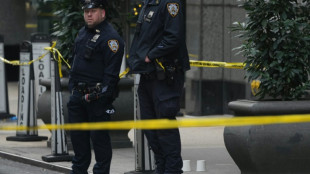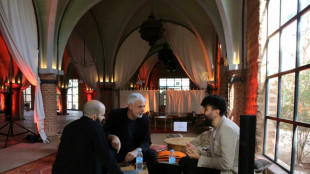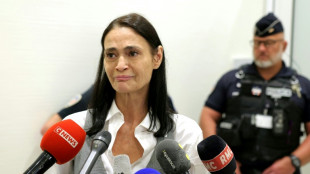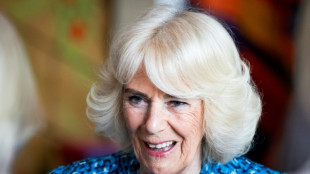-
 Iran Nobel winner released for three weeks, 'unconditional' freedom urged
Iran Nobel winner released for three weeks, 'unconditional' freedom urged
-
Red Cross marks record numbers of humanitarians killed in 2024

-
 Johnson's Grand Slam 'no threat', says World Athletics boss Coe
Johnson's Grand Slam 'no threat', says World Athletics boss Coe
-
Qatar's emir and UK's Starmer talk trade as state visit ends

-
 Cuba suffers third nationwide blackout in two months
Cuba suffers third nationwide blackout in two months
-
Russia, Ukraine to send top diplomats to OSCE summit in Malta

-
 Spanish royals to attend memorial service for flood victims
Spanish royals to attend memorial service for flood victims
-
LPGA, USGA new policy requires female at birth or pre-puberty change

-
 Stick to current climate change laws, US tells top UN court
Stick to current climate change laws, US tells top UN court
-
British Museum chief says Marbles deal with Greece 'some distance' away

-
 Pope Francis receives electric popemobile from Mercedes
Pope Francis receives electric popemobile from Mercedes
-
Gaza civil defence: thousands flee Israeli strikes, evacuation calls

-
 Trump names billionaire private astronaut as next NASA chief
Trump names billionaire private astronaut as next NASA chief
-
Pidcock to leave INEOS Grenadiers at end of season

-
 Seoul stocks weaken, Paris advances despite political turmoil
Seoul stocks weaken, Paris advances despite political turmoil
-
South America summit hopes to seal 'historic' trade deal with EU

-
 DAZN awarded global TV rights for Club World Cup
DAZN awarded global TV rights for Club World Cup
-
Top executive shot dead outside New York hotel

-
 Vaping while still smoking unlikely to help quitters: study
Vaping while still smoking unlikely to help quitters: study
-
British Museum chief says Parthenon Marbles deal with Greece 'some distance' away

-
 'Creating connections': Arab, African filmmakers gather at Morocco workshops
'Creating connections': Arab, African filmmakers gather at Morocco workshops
-
Iran frees Nobel winner for three weeks, sparking calls for 'permanent' release

-
 Brazil's Minas cheese gets added to UNESCO list
Brazil's Minas cheese gets added to UNESCO list
-
Top US executive shot dead in New York City: media

-
 Trump's nominee to run Pentagon hangs by a thread
Trump's nominee to run Pentagon hangs by a thread
-
GM announces more than $5 bn hit to earnings in China venture

-
 World chess champ Ding, teen challenger tied past halfway mark
World chess champ Ding, teen challenger tied past halfway mark
-
Georgia police raid opposition offices as PM vows to curb protests

-
 S. Korea opposition begins push to impeach president
S. Korea opposition begins push to impeach president
-
Syrian army fights rebel offensive with counterattack

-
 France court upholds Polanski acquittal in defamation case
France court upholds Polanski acquittal in defamation case
-
UK bans daytime TV ads for cereals, muffins and burgers

-
 Palace's Guehi to face no formal action over 'Jesus' message on rainbow armband
Palace's Guehi to face no formal action over 'Jesus' message on rainbow armband
-
UK faces trade balancing act with Trump, EU

-
 Iran releases Nobel Peace laureate Mohammadi on medical leave: lawyer
Iran releases Nobel Peace laureate Mohammadi on medical leave: lawyer
-
UNESCO grants heritage status to Aleppo soap as Syria war flares

-
 Ghana's illegal mining boom seeps into presidential election
Ghana's illegal mining boom seeps into presidential election
-
Inconsistent Spurs 'progressing in all aspects': Postecoglou

-
 France's Orano says Niger junta controls uranium firm
France's Orano says Niger junta controls uranium firm
-
Seoul stocks weaken, Paris edges up tracking political turmoil

-
 China reports warmest autumn since records began
China reports warmest autumn since records began
-
French marine park to close over law banning killer whale shows

-
 Thousands march demanding S. Korea president resign over martial law debacle
Thousands march demanding S. Korea president resign over martial law debacle
-
Taiwan romance novelist Chiung Yao dies at 86

-
 In Angola, Biden promises to invest differently to China
In Angola, Biden promises to invest differently to China
-
Syrian army launches counteroffensive against rebels

-
 Evenepoel says 'long journey' ahead after postal van collision
Evenepoel says 'long journey' ahead after postal van collision
-
South Korea's day of rage as Yoon's martial law founders

-
 UK police question killer nurse Letby over further baby deaths
UK police question killer nurse Letby over further baby deaths
-
Cameroon curator Kouoh is first African woman to lead Venice Biennale

EU supports reduced protection for wolves
EU member states on Wednesday voted in favour of lowering the protection status of wolves, a move decried by conservationists that paves the way for a relaxation of tight hunting restrictions.
Grey wolves were virtually exterminated in Europe a century ago, but their numbers have rebounded thanks to conservation efforts, triggering howls of protest from farmers angered at livestock losses.
Representatives of the 27 EU states backed a proposal to push for changes to an international wildlife convention that would see the species downgraded from "strictly protected" to "protected".
Only two countries voted against, according to a diplomatic source and the the European Commission, which put forward the plan, welcomed its approval.
Steffi Lemke, Germany's environment minister, said a rising wolf population made the decision "justifiable from a nature conservation perspective and necessary from the point of view of livestock farmers."
In 2023, there were breeding packs of grey wolves in 23 European Union countries, with a total population estimated at around 20,300 animals, bringing the elusive creatures into more frequent contact with humans.
In announcing plans to revise the protection status last year, Commission chief Ursula von der Leyen said the "concentration of wolf packs in some European regions has become a real danger especially for livestock".
Von der Leyen herself lost her beloved pony Dolly to a wolf that crept into an enclosure on her family's rural property in Germany two years ago -- leading some to suggest the matter had become personal.
- 'Politically motivated' -
The wolf became a "strictly protected" species under the 1979 Bern Convention, to which the EU is a party.
The text allows for the animal to be killed or captured only when it poses a threat to livestock, health or safety.
The commission's proposal would loosen such rules by demoting wolves to "protected" species, which would allow hunting under strict regulation.
This year has seen rolling protests by farmers around Europe against the bloc's environmental rules.
The pan-European farmers group Copa-Cogeca welcomed "a major step forward in the management of wolf populations and harmonious co-existence" while the FACE European Hunting Federation called it an all-round "victory".
But animal rights activists fear that the change could result in large numbers of wolves being hunted.
Already in 2022, several Austrian regions authorised the killing of wolves in what critics argued was a breach of current European laws.
More than 300 environmental and animal protection organisations opposed a status downgrade, arguing it was premature since while population numbers have grown, their recovery is ongoing.
In a letter, they said there was no evidence that culling reduced depredation on farmed animals. Hunting was no replacement for other prevention measures, such as fencing, they argued.
"We see this as a proposal that is politically motivated and not at all based on science," Sabien Leemans, senior policy officer at environmental group WWF, told AFP.
- Small impact -
A 2023 EU report found that the overall impact of wolves on livestock was "very small". Only 0.065 percent of the bloc's 60 million sheep were mauled to death every year and just over 18 million euros ($20 million) was paid to compensate for wolf damage annually.
The report said horses, dogs and other animals were also sometimes slain -- but that no fatal wolf attacks on people have been recorded in Europe over the past 40 years.
Wednesday's vote, once formally adopted by the bloc's environment ministers, will give the EU a mandate to push for a change in the Bern Convention at a meeting in December.
A two-thirds majority is required to alter the text, which was signed by 50 countries, including the 27 EU members.
If the convention is changed, the commission will then be allowed to move to amend related EU rules.
"Today's decision... empowers rural communities to take the necessary steps to protect themselves," said Herbert Dorfmann, a lawmaker with the conservative European People's Party (EPP), the largest group in the European Parliament.
But Leemans of the WWF warned it risked opening a "Pandora's box". Some countries are already pushing to ease hunting rules for brown bears too, she argued -- a concern dismissed by the commission.
"What we're talking about is the wolf, and only the wolf," commission spokesman Adalbert Jahnz told reporters.
A.Gasser--BTB


